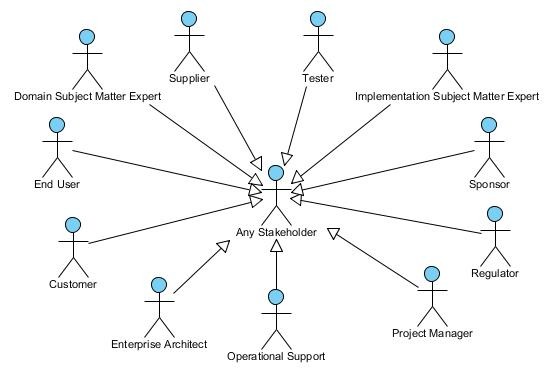

Stakeholders
Any Stakeholder - Any stakeholder can be a source of requirements, assumptions, or constraints.
Customer - A stakeholder who uses or may use products or services produced by the enterprise and may have contractual or moral rights that the enterprise is obliged to meet. A customer may also be a Sponsor - A stakeholder who is responsible for initiating the effort to define a business need and develop a solution that meets that need. They authorize the work to be performed and control the budget and scope for the initiative. A customer uses or may use products or services produced by the enterprise and may have contractual or moral rights that the enterprise is obliged to meet.
Domain Subject Matter Expert - A domain subject matter expert is any individual with in-depth knowledge of a topic relevant to the business need or solution scope. This role is often filled by people who may be end users or people who have in-depth knowledge of the solution such as managers, process owners, legal staff, consultants, and others. A stakeholder with in-depth knowledge of a topic relevant to the business need or solution scope.
End User - End users are stakeholders who directly interact with the solution. End users can include all participants in a business process, or who use the product or solution. A stakeholder who directly interacts with the solution.
Enterprise Architect - Role is not defined in the BOBAK. The enterprise architect is responsible for the interfaces and distributed functionality between systems in the enterprise.
Implementation Subject Matter Expert - An implementation subject matter expert is any stakeholder who has specialized knowledge regarding the implementation of one or more solution components. While it is not possible to define a listing of implementation subject matter expert roles that are appropriate for all initiatives, some of the most common roles are: project librarian, change manager, configuration manager, solution architect, developer, database administrator, information architect, usability analyst, trainer, and organizational change consultant. A stakeholder who has specialized knowledge regarding the implementation of one or more solution components.
Operational Support - Operational support is responsible for the day-to-day management and maintenance of a system or product. While it is not possible to define a listing of operational support roles that are appropriate for all initiatives, some of the most common roles are: operations analyst, product analyst, help desk, and release manager. A stakeholder who is responsible for the day-to-day management and maintenance of a system or product.
Project Manager - Project managers are responsible for managing the work required to deliver a solution that meets business needs, and for ensuring that the project's objectives are met while balancing scope, budget, schedule, resources, quality, and risk. The project manager works with a team including process analysts, process owners, and process designers and is responsible for planning, scheduling, communication management, change management, and risk management.
Regulator - Regulators are responsible for the definition and enforcement of standards. Standards can be imposed on the solution by regulators through legislation, corporate governance standards, audit standards, or standards defined by organizational centers of competency. Alternate roles are government, regulatory bodies, and auditor. A stakeholder from outside the organization who is responsible for the definition and enforcement of standards.
Sponsor - Sponsors are responsible for initiating the effort to define a business need and develop a solution that meets that need. They authorize the work to be performed, and control the budget and scope for the initiative. Alternate roles are executive and project sponsor. A stakeholder who is responsible for initiating the effort to define a business need and develop a solution that meets that need. They authorize the work to be performed and control the budget and scope for the initiative.
Supplier - A supplier is a stakeholder outside the boundary of a given organization or organizational unit. Suppliers provide products or services to the organization and may have contractual or moral rights and obligations that must be considered. Alternate roles are providers, vendors, and consultants. A stakeholder outside the boundary of a given organization or organizational unit who provides products or services to the organization and may have contractual or moral rights and obligations that must be considered.
Tester - Testers are responsible for determining how to verify that the solution meets the requirements defined by the business analyst, as well as conducting the verification process. Testers also seek to ensure that the solution meets applicable quality standards, and that the risk of defects or failures is understood and minimized. An alternate role is quality assurance analyst. An individual responsible for determining how to verify that the solution meets the requirements defined by the business analyst, and conducting the verification process.
Stakeholders are the people who participate in creation, approval or take ownership of business analysis artifacts. People are identified by the role they play, with the same person playing multiple roles, or the same role played by multiple people.